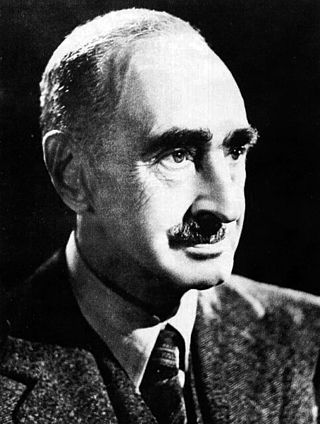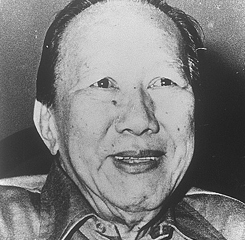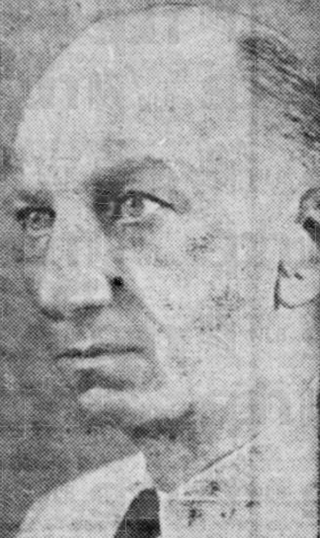
The Federation of Malaya, more commonly known as Malaya, was a country of what previously had been the Malayan Union and, before that, British Malaya. It comprised eleven states – nine Malay states and two of the Straits Settlements, Penang and Malacca. It was established on 1 February 1948.

The Federated Malay States was a federation of four protected states in the Malay Peninsula — Selangor, Perak, Negeri Sembilan and Pahang — established in 1895 by the British government, and which lasted until 1946. In that year they formed the Malayan Union together with two of the former Straits Settlements,, and the Unfederated Malay States. Two years later, the union became the Federation of Malaya, which achieved independence in 1957, and finally Malaysia in 1963 with the inclusion of North Borneo, Sarawak and Singapore.

Sultan Sir Ibrahim Al-Masyhur ibni Almarhum Sultan Abu Bakar Al-Khalil Ibrahim Shah was a Malaysian sultan and the 2nd modern Sultan of Johor and 22nd Sultan of Johor overall. He was considered "fabulously wealthy."

Tan Chong Tee was a Chinese resistance fighter based in Singapore and Malaya during World War II. An accomplished badminton player before the war, he joined Force 136 around 1942 after Singapore fell to the Japanese. In 1944, while on a mission, Tan, along with Lim Bo Seng and other Force 136 members, was captured by the Japanese. He was subjected to torture during his captivity. After the war, he returned to playing badminton and later became a businessman.

Tun Sir Tan Cheng Lock KBE, SMN, DPMJ, JP was a Malaysian Peranakan businessman and a key public figure who devoted his life to fighting for the rights and the social welfare of the Chinese community in Malaya. Tan was also the founder and the first president of the Malayan Chinese Association (MCA), which advocated his cause for the Malayan Chinese population.

Sir Thomas Shenton Whitelegge Thomas was a British colonial administrator most notable for his role as Governor of the Straits Settlements in Singapore.

Sir Andrew Caldecott was a British colonial administrator.
Sir Husein Hasanally Abdoolcader Mama was a Dawoodi Bohra by faith and a barrister and politician by profession in Malaya born in Surat, Bombay Presidency, British India. His eldest son Tan Sri Eusoffe Abdoolcader was also a prominent figure in Malaya and was a judge at the Supreme Court of Malaysia.

Wong Peng Soon, was a Malayan/Singaporean badminton player who reigned as a top player in Malaya from the 1930s to the 1950s when it was a single nation. Noted for his smooth but powerful strokes and graceful footwork, he won the singles title seven times in Singapore and eight times in Malaya during this period, as well as being the top player in the All England, the Danish Open, the Indian and Philippines championships to name a few.
This article lists important figures and events in the public affairs of British Malaya during the year 1946, together with births and deaths of prominent Malayans. Malaya remained under British Military Administration until the establishment of the Malayan Union on 1 April.
Lim Koon Teck was a barrister-at-law, industrialist and politician in the Malaya and Singapore. He was the first Asian in the Straits Settlements to be appointed to the Colonial Legal Service. He was a magistrate at Penang and Crown Counsel, Singapore. After resigning government service, he joined the Lee Rubber Company. He was interested in introducing new construction methods, like lightweight concrete, to bring down building costs and was interested in helping to solve Singapore's housing shortage. These directed his commercial and political activities.

Malaysia's armed forces, which encompasses three major branches, originate from the formation of local military forces in the first half of the 20th century, during British colonial rule of Malaya and Singapore prior to Malaya's independence in 1957. The branches have undergone several restructuring, but fundamentally includes the army, navy and air force.
Leong Sin Nam, alias Leong Sin, Leung Sin, Leong Sin Hee, was a Malaysian businessman. He migrated and settled in British Malaya in 1898. From humble beginnings, he worked hard to become a wealthy tin mine owner in Perak. He was a businessman, an active community leader and a philanthropist. He was a Chinese revolutionary with similar aspirations as Sun Yat-sen and a strong supporter of the Chinese war efforts during the Sino-Japanese war.

Joseph Choo Seng Quee, popularly known as Uncle Choo, was a Singaporean footballer and football coach. He was coach of the Indonesia, Malaya/Malaysia and Singapore national teams. He is widely recognised as one of Singapore's best football coaches.

Sir Han Hoe Lim was a Singaporean physician and politician.

Wilfred Lawson Blythe was a British colonial administrator who served as the second Colonial Secretary of Singapore from 30 June 1950 to 30 July 1953.
Sir Alexander Sym Small was a colonial administrator. He joined the Malayan Civil Service and was a cadet in January 1911 and served most of his Civil Service career in Federated Malay States (FMS) and Straits Settlements (SS). He retired as the Colonial Secretary of Straits Settlements in 1940.

Sydney Bacon Palmer was the first chairman of the Malaysian Estates Staff Provident Fund. He also held various roles in the Selangor Turf Club and the Rotary Club of Taiping, and was an advocate for the propagation of the use of natural rubber. He was also a member of the State Council of Perak, a Federal Councillor, president of the United Planting Association of Malaya and an unofficial member of the Malayan Union Advisory Council. He served on various Malayan committees and boards.
Charles Roberts Howitt CMG was a British colonial administrator who served in Malaya.













